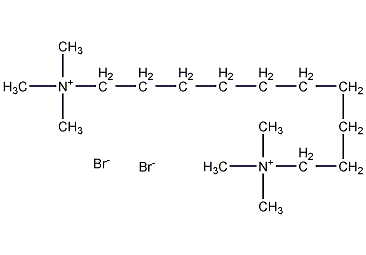Decahydrocarbon quaternary ammonium bromide


Structural formula
| Business number | 05KP |
|---|---|
| Molecular formula | C16H38N2Br2 |
| Molecular weight | 418.29 |
| label |
N,N,N,N’,N’,N’-hexamethyl-1,10-decyl ammonium dibromide, Decamonium bromide, Decanediamine bromide, Decanediamine bromide, Decamethylene bis(trimethylammonium bromide), 1,10-Decanediaminium,N,N,N,N’,N’,N’-hexamethyl-,dibromide |
Numbering system
CAS number:541-22-0
MDL number:MFCD00011779
EINECS number:208-772-2
RTECS number:BP5950000
BRN number:None
PubChem ID:None
Physical property data
1. Character: White crystal
2. Density (g/ cm3, 25/4℃): Undetermined
3. Relative Steam density (g/cm3, air=1): Undetermined
4. Melting point (ºC, decomposition): 268~270
5. Boiling point (ºC, normal pressure): Undetermined
6. Boiling point (ºC, 8kPa): Undetermined
7. Refractive index: Undetermined
8 . Flash point (ºC): Not determined
9. Specific rotation (º): Undetermined
10. Autoignition point or ignition temperature (ºC): Not determined
p>
11. Vapor pressure (kPa, 25ºC): Undetermined
12. Saturated vapor pressure (kPa, 55.1ºC): Undetermined
13. Heat of combustion ( KJ/mol): Undetermined
14. Critical temperature (ºC): Undetermined
15. Critical pressure (KPa): Undetermined
16. The logarithmic value of the oil-water (octanol/water) distribution coefficient: Undetermined
17. Explosion upper limit (%, V/V): Undetermined
18. Explosion lower limit (%, V/V): Undetermined
19. Solubility: Easily soluble in water and ethanol, very slightly soluble in chloroform, almost insoluble in ether.
Toxicological data
1. Acute toxicity: Rat intraperitoneal LD50: 2900 ug/kg, no details except lethal dose;
Mouse oral LD50: 190mg/kg, dyspnea;
Mouse intraperitoneal LD50: 900ug/kg, no detailed instructions except the lethal dose;
Mouse subcutaneous LD50: 4 mg/kg, no detailed instructions except the lethal dose;
Mouse intravenous LD50: 630ug/kg, no details except lethal dose;
Cat intravenous LD50: 35ug/kg, dyspnea;
Rabbit Intravenous LD50: 125ug/kg, dyspnea;
2. Other multiple dose toxicity data: rat intraperitoneal LD50: 75 mg/kg/5W-I, ataxia;
Ecological data
This substance may be harmful to the environment, and special attention should be paid to water bodies.
Molecular structure data
None yet
Compute chemical data
1. Reference value for hydrophobic parameter calculation (XlogP):
2. Number of hydrogen bond donors: 0
3. Number of hydrogen bond acceptors: 2
4. Number of rotatable chemical bonds: 11
5. Number of tautomers:
6. Topological molecular polar surface area (TPSA): 0
7. Number of heavy atoms: 20
8. Surface charge: 0
9. Complexity: 164
10. Number of isotope atoms: 0
11. Determine the number of atomic stereocenters: 0
12. Uncertain number of atomic stereocenters: 0
13. Determine the number of chemical bond stereocenters : 0
14. The number of uncertain stereocenters of chemical bonds: 0
15. The number of covalent bond units: 3
Properties and stability
White crystal. Hygroscopic. Easily soluble in water and ethanol, very slightly soluble in chloroform, almost insoluble in ether. Melting point: 268~270℃ (decomposition). poisonous. Irritating.
Use and store according to specifications. It will not decompose and avoid contact with oxides.
Storage method
Stored in a cool, dry and well-ventilated warehouse. Keep away from fire and heat sources. Protect from direct sunlight. The packaging is sealed. They should be stored separately from acids and food chemicals, and avoid mixed storage. Suitable materials should be available in the storage area to contain spills.
Synthesis method
None yet
Purpose
For biochemical research. Ion pair chromatography reagents. medicine.
